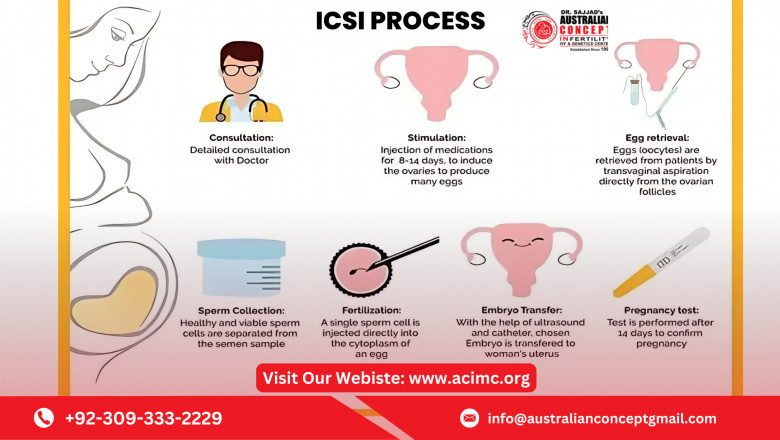views
Introduction
When couples struggle with infertility and turn to advanced techniques like ICSI (Intracytoplasmic Sperm Injection), many are surprised to learn how vital the embryologist is to their treatment journey.
Understanding ICSI: A Quick Overview
ICSI is a specialized form of IVF where a single sperm is directly injected into an egg. This method is often recommended for cases of severe male infertility, low sperm motility, or previous IVF failure.
Unlike traditional IVF, where eggs and sperm are mixed together to allow natural fertilization, ICSI requires skilled hands and precision equipment that's where the embryologist steps in.
The Embryologist’s Role in the ICSI Procedure
An embryologist is responsible for several critical steps in the ICSI process:
1. Sperm Preparation
Before the ICSI procedure begins, the embryologist prepares the sperm sample.
-
They select the healthiest, most motile sperm from the sample using advanced techniques.
-
In cases of azoospermia (no sperm in the ejaculate), the embryologist may work with surgically retrieved sperm from the testes.
2. Egg Preparation
After eggs are retrieved from the female partner, the embryologist prepares them for injection:
-
The surrounding cumulus cells are carefully removed to visualize and assess the maturity of each egg.
-
Only mature eggs (in metaphase II) are selected for the ICSI procedure.
3. Micromanipulation and Sperm Injection
This is the most delicate part of the ICSI process:
-
Using a high-powered microscope and micromanipulation tools, the embryologist picks up a single sperm in a fine needle.
-
The sperm is gently injected directly into the cytoplasm of the egg.
-
Precision and experience are key to avoiding damage to the egg during this critical step.
4. Monitoring Fertilization
After injection, the embryologist closely monitors the eggs to check for signs of successful fertilization:
-
Typically, fertilization assessment is done 16–18 hours after ICSI.
-
They look for the presence of two pronuclei, which indicate that fertilization has occurred.
5. Embryo Culture and Development
Following fertilization, the embryologist nurtures the developing embryos in a carefully controlled laboratory environment:
-
Special incubators maintain the ideal temperature, humidity, and gas conditions.
-
Embryos are monitored daily for cell division and quality.
-
The embryologist grades and selects the best embryos for transfer or freezing.
6. Embryo Transfer Support
On the day of embryo transfer, the embryologist works closely with the fertility specialist:
-
They prepare and load the selected embryo(s) into a special transfer catheter.
-
The embryo is handed over safely and accurately to the fertility doctor for uterine transfer.
7. Cryopreservation (Freezing)
Excess good-quality embryos are cryopreserved by the embryologist:
-
Vitrification, a rapid freezing technique, is used to protect embryos for future use.
-
Proper freezing and storage ensure high survival rates when thawed later for a frozen embryo transfer (FET) cycle.
Why the Embryologist’s Expertise Matters
The success of the ICSI procedure depends heavily on the embryologist's:
-
Technical skills
-
Knowledge of embryo development
-
Precision during micromanipulation
-
Ability to troubleshoot any unexpected challenges
Simply put, an experienced embryologist dramatically increases the chances of achieving fertilization and healthy embryo development, leading to better IVF outcomes.
Conclusion:
The embryologist plays an essential and irreplaceable role throughout the ICSI journey — from sperm and egg preparation to sperm injection, embryo development, and cryopreservation.
Their expertise behind the scenes ensures that patients have the best possible chance of achieving a successful pregnancy. If you're considering ICSI treatment, make sure you choose a fertility center with a highly skilled embryology team — they truly are the heart of the lab!
For More Details: https://acimc.org/ivf-lahore/














Comments
0 comment